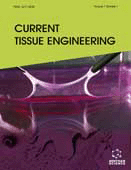Abstract
Current stem cell research greatly depends on suitable in vitro-cultivation approaches, enabling expansion, differentiation, cryopreservation or genetic modification of stem cells outside the organism. Particularly regarding neurodegenerative diseases, regeneration of complex injuries or cancer, this already great field of applications is even broadened by in vitro-culture approaches for stem cell-based therapy. Here, 2D-concepts of cultivation focus on cell differentiation or short-time expansion for further transplantation as well as the elucidation of molecular mechanisms of a certain disease for drug targeting.
However, latest studies suggest potential beneficial effects of 3D cultivation strategies. In contrast to 2D-culture, the conditions of the endogenous stem cell niche are mirrored more closely, leading to improved cellular viability and differentiation behavior. The use of 3D-cultivated stem cell-products may provide the advantages of direct transplantation, enhanced graft adherence and higher cellular loading densities within the transplant. Thus, together with the increased differentiation potential of stem cells under such conditions, 3D-culture may provide a powerful tool for regenerative medicine.
Here, we summarize current 3D-cultivation approaches for adult, embryonic and cancer stem cells, highlighting their potential scientific and clinical impacts.
Keywords: 3D-culture, adult stem cells, embryonic stem cells, neural crest stem cells, stem cell niche, stem cells, transplantation
 28
28

